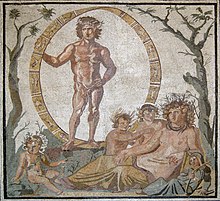Our website is made possible by displaying online advertisements to our visitors.
Please consider supporting us by disabling your ad blocker.
Uran (mitologija)
| Uran | |
|---|---|
 | |
| Grupe | Grčki primordijalni bogovi |
| Suprug(a) | Geja |
| Mitologija | Grčka mitologija |

Uran (grč. Οὐρανός, Ouranós) primordijalni je bog neba. Prema Hesiodu Uran je bio sin i muž Geje (Zemlja), s kojom je rodio prvu generaciju Titana i većine ostalih bogova. Ciceron u svom djelu De natura deorum tvrdi da je Eterov i Hemerin potomak, a prema orfičkim je Niktin sin. Njegov pandan u rimskoj mitologiji je Cel (lat. Caelus), a u hinduizmu Varuna. Uran je povezan sa Eonom. Nijedan kult upućen direktno Uranu nije preživio do klasičnog doba,[1] a Uran se ne pojavljuje među uobičajenim temama grčke oslikane keramike. Elementarna Zemlja, Nebo i Stiks mogu se, međutim, spojiti u svečanoj invokciji u Homerovom epu.[5] Uran je povezan sa rimskim bogom Celom.[2][3][4][5][6]
- ^ "We did not regard them as being in any way worthy of worship," Karl Kerenyi, speaking for the ancient Greeks, said of the Titans (Kerenyi, str. 20); "with the single exception, perhaps, of Cronos; and with the exception, also, of Helios."
- ^ As at Homer, Iliad 15.36 ff., Odyssey 5.184 ff.
- ^ Grimal, s.v. "Caelus" str. 38.
- ^ Varro, De lingua Latina 5.58.
- ^ Marion Lawrence, "The Velletri Sarcophagus", American Journal of Archaeology 69.3 (1965), str. 220.
- ^ Floro, Epitome 1.40 (3.5.30): "The Jews tried to defend Jerusalem; but he [Pompeius Magnus] entered this city also and saw that grand Holy of Holies of an impious people exposed, Caelum under a golden vine" (Hierosolymam defendere temptavere Iudaei; verum haec quoque et intravit et vidit illud grande inpiae gentis arcanum patens, sub aurea vite Caelum). Finbarr Barry Flood, The Great Mosque of Damascus: Studies on the Makings of an Umayyad Visual Culture (Brill, 2001), pp. 81 and 83 (note 118). El Oxford Latin Dictionary (Oxford: Clarendon Press, 1982, 1985 reprinting), str. 252, entry on caelum, cita a Juvenal, Petronio, and Floro como ejemplos de Caelus o Caelum "with reference to Jehovah; also, to some symbolization of Jehovah."
Previous Page Next Page


